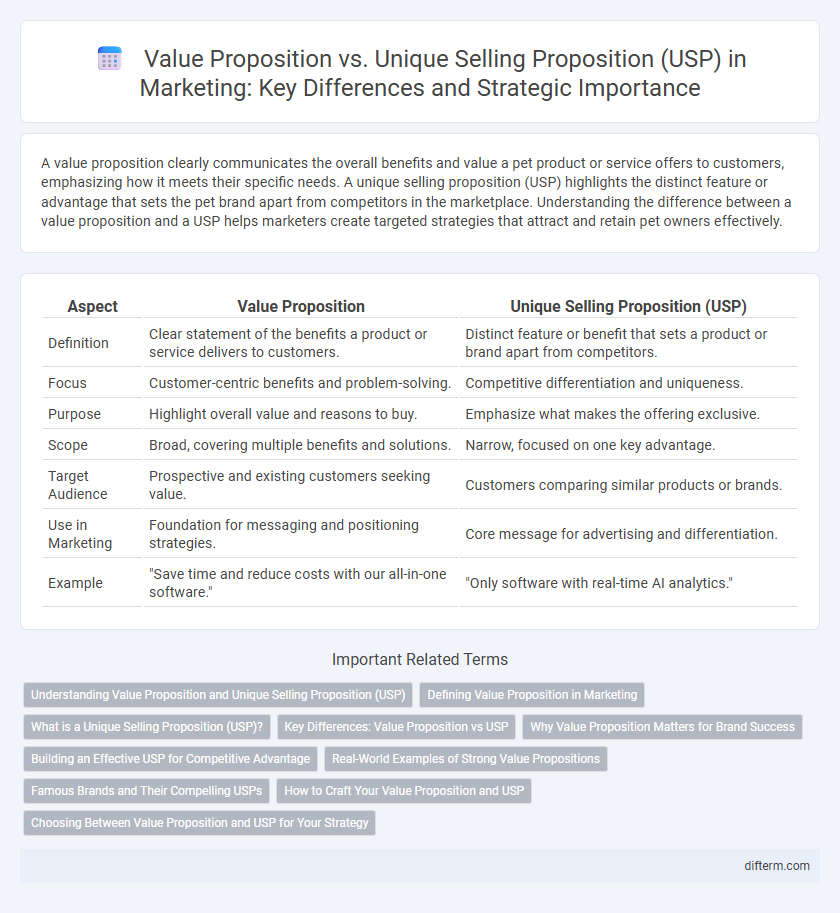A value proposition clearly communicates the overall benefits and value a pet product or service offers to customers, emphasizing how it meets their specific needs. A unique selling proposition (USP) highlights the distinct feature or advantage that sets the pet brand apart from competitors in the marketplace. Understanding the difference between a value proposition and a USP helps marketers create targeted strategies that attract and retain pet owners effectively.
Table of Comparison
| Aspect | Value Proposition | Unique Selling Proposition (USP) |
|---|---|---|
| Definition | Clear statement of the benefits a product or service delivers to customers. | Distinct feature or benefit that sets a product or brand apart from competitors. |
| Focus | Customer-centric benefits and problem-solving. | Competitive differentiation and uniqueness. |
| Purpose | Highlight overall value and reasons to buy. | Emphasize what makes the offering exclusive. |
| Scope | Broad, covering multiple benefits and solutions. | Narrow, focused on one key advantage. |
| Target Audience | Prospective and existing customers seeking value. | Customers comparing similar products or brands. |
| Use in Marketing | Foundation for messaging and positioning strategies. | Core message for advertising and differentiation. |
| Example | "Save time and reduce costs with our all-in-one software." | "Only software with real-time AI analytics." |
Understanding Value Proposition and Unique Selling Proposition (USP)
A Value Proposition clearly communicates the benefits a product or service delivers to meet customer needs, emphasizing value creation and problem-solving. In contrast, a Unique Selling Proposition (USP) highlights distinctive features or attributes that set a brand apart from competitors in the marketplace. Understanding both concepts enables marketers to craft compelling messages that resonate with target audiences and drive competitive advantage.
Defining Value Proposition in Marketing
A value proposition in marketing clearly communicates the unique benefits and value a product or service delivers to customers, emphasizing how it solves a problem or improves their situation. It focuses on customer needs, highlighting the specific advantages and outcomes that differentiate the offering from competitors. Defining a strong value proposition requires deep understanding of target audience pain points, preferences, and the key benefits that resonate most effectively to drive purchasing decisions.
What is a Unique Selling Proposition (USP)?
A Unique Selling Proposition (USP) is a distinct feature or benefit that sets a product or service apart from competitors, emphasizing what makes it uniquely valuable to customers. Unlike a value proposition, which broadens customer benefits and overall value, the USP zeroes in on specific, exclusive attributes that cannot be easily replicated. Effective USPs drive competitive advantage by highlighting clear, compelling reasons why consumers should choose one brand over others.
Key Differences: Value Proposition vs USP
A value proposition clearly communicates the comprehensive benefits and solutions a product or service offers to meet customer needs, emphasizing overall value and problem-solving. In contrast, a unique selling proposition (USP) highlights the distinct feature or advantage that sets a product apart from competitors, focusing on exclusivity and differentiation. Understanding these key differences helps marketers craft targeted messaging that drives customer engagement and competitive positioning.
Why Value Proposition Matters for Brand Success
A value proposition clearly communicates the unique benefits a brand delivers to customers, aligning with their needs and preferences, which fosters stronger emotional connections and trust. Unlike a unique selling proposition (USP) that highlights a distinctive feature, a value proposition emphasizes overall customer experience and problem-solving capacity, driving long-term loyalty and competitive advantage. Brands with compelling value propositions achieve higher conversion rates, customer retention, and market differentiation, critical factors for sustained business growth.
Building an Effective USP for Competitive Advantage
A compelling unique selling proposition (USP) clearly communicates the distinct benefits of a product or service that set it apart from competitors, driving customer preference and loyalty. Unlike a broader value proposition, the USP zeroes in on specific features or advantages that solve key pain points or fulfill unmet needs in the target market. Crafting an effective USP involves thorough market research, understanding customer desires, and highlighting measurable results to establish a sustainable competitive advantage.
Real-World Examples of Strong Value Propositions
Apple's value proposition centers on seamless integration and innovative design, delivering a superior user experience through its ecosystem of devices. Tesla's value proposition emphasizes sustainable energy and cutting-edge automotive technology, revolutionizing electric vehicles with high performance and long range. Nike's strong value proposition leverages inspiration and innovation, encouraging athletes of all levels to achieve their personal best through quality products and powerful storytelling.
Famous Brands and Their Compelling USPs
Famous brands leverage compelling unique selling propositions (USPs) to distinguish themselves in competitive markets, emphasizing specific qualities like Apple's innovation-driven design or Coca-Cola's timeless authenticity. Their value propositions communicate the overall benefit and experience consumers can expect, such as Nike's empowerment through performance and style. Understanding the distinction between value proposition and USP enables marketers to craft targeted messages that resonate emotionally and functionally with their audience.
How to Craft Your Value Proposition and USP
Crafting your value proposition requires identifying the core benefits your product or service delivers, clearly addressing customer pain points with specific solutions. Developing a unique selling proposition (USP) involves pinpointing the distinct attributes that differentiate your brand from competitors, emphasizing originality and exclusivity in your messaging. Effective marketing strategies integrate both by communicating compelling, customer-focused value alongside unique, memorable features that drive purchasing decisions.
Choosing Between Value Proposition and USP for Your Strategy
A value proposition clearly communicates the benefits and solutions a product or service offers to meet customer needs, while a unique selling proposition (USP) highlights the distinct features that set it apart from competitors. Choosing between a value proposition and USP depends on whether the focus is on overall customer value or differentiation in a crowded market. Aligning your marketing strategy with either a comprehensive value message or a sharp competitive edge ensures stronger brand positioning and customer engagement.
Value proposition vs unique selling proposition (USP) Infographic

 difterm.com
difterm.com